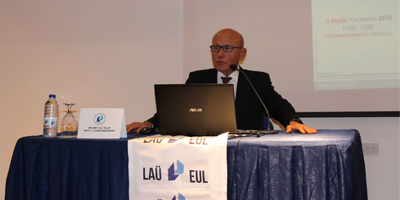Talat, the 2nd President of the T.R.N.C. gave a conference at EUL

“The Future of Cyprus Negotiations” themed conference held at EUL
European University of Lefke (EUL) Faculty of Economic and Administrative Sciences Departments of International Relations and Public Administration organized a conference themed “The Future of Cyprus Negotiations”. Mehmet Ali Talat, the 2nd President of the T.R.N.C. attended the conference as a speaker.
Talat underlined that Cyprus issue is a very hard issue inherently and due to the uncertainty of the near feature it becomes more and more complex, and added that in order to solve the Cyprus Problem main problems should be evaluated and in this context he attracted the attention to the some turning points while summarizing the Cyprus Problem.
Talat: In 1963 Greek Cypriots wanted to become superior in many cases by doing constitutional amendments.
Talat said that when the Cyprus Republic was establish in 1960, both Turkish Cypriots and Greek Cypriots regarded this with confusion and saw it as a source of disturbance because both communities were not ready for a sovereignty. Pointing out that this situation lasted until 1963, Talat said that in 1963 Greek Cypriots wanted to become superior in many cases by doing constitutional amendments however it was rejected. Emphasizing that upon this, by using armed force they seized the state and exiled the Turkish Cypriots from all institutions of the state and deprived them of the possibility of representation, Talat stated that this situation continued until 1967 with the attacks of Greek and Greek soldiers and militias against Turkish regions. Talat further said that upon the military intervention threat of Turkey, Greece soldiers left the island, and despite according some rights to the Turkish Cypriots such as right to travel under the framework of “normalization process” with the leadership of Makarios, this normalization process did not involve comeback of the Turkish Cypriots to the state institutions. Talat said that “As from this date, negotiations between two sides in order to solve the disputes has started and sometimes draft agreements were created” and added that none of these produces a desired result. Talat said that “When the year was 1974, upon the military coup organized by the Greek Junta and which clearly aimed Enosis, with the role of “Warrantor” and after consultations with the other Warrantor Country England Turkey did a military intervention to the island” and added that the year of 1974 has changed many parameters including the description of the Cyprus Problem. He further stated that the arguments before 1974 were related with the different versions of Unitary Cyprus however, after 1974 the basis of the arguments based upon how to create a bi-communal, bi-zonal federation.
Talat also said that, under this framework, the solution negotiations were conducted under the auspices of United Nations (UN) and different solution suggestions were proposed and he proceed his speech with some concrete examples. He said that “The first of these developments is the European Union (EU) membership application of Cyprus Republic in 1990, the other is membership statue granted to Cyprus in 1999 from the EU-Turkey Customs Union which entered into force in 1999”. Talat also underlined the indirect talks on the UN agenda and ongoing EU accession negotiations with Cyprus in the same era and stated that The UN wanted to use this as an opportunity by linking the EU with the Cyprus problem.
Talat: The Annan Plan was rejected because Greek Cypriots did not want to share the rights they owned with the Turkish Cypriots.
Touching upon the Annan plan with was proposed in 2002 and rejected in 204, Talat emphasized that in 1999 General Secretary of UN Kofi Annan stated that “The Cyprus problem is a unique issue, so the solution should be unique and not to be compared to any other situation”. Talat continued his speech by stating that at the beginning of the 2000s where indirect and face-to-face negotiations started to be obstructed, The Annan Plan was concluded and in 2002 it was proposed to the sides and added that it should be noted that when the plan was offered to the referendum, Southern Cyprus had already signed a membership agreement with the EU. Talat further continued that the rejection of the Annan Plan by the Greek Cypriots and the acceptance by the Turkish Cypriots who were accused as the only obstacle to the failure to find a solution to the Cyprus problem had created a great surprise in the international community and added that the Annan Plan was rejected because Greek Cypriots did not want to share the rights they owned with the Turkish Cypriots.
Talat: The solution lies in the principle of political equality between the two sides
Pointing out that the solution lies in the principle of political equality between the two sides, Talat said that “According to this, the Greek Cypriot side should accept the principle of political equality and the fact that Turkish Cypriots have the right to speak in the administration”. He further stated that Greek Cypriot side must explain what they understand from federalism clearly and added that “The future of the Cyprus Negotiations which is in a dead end depends primarily on this”. Talat also said that convincing both communities for a solution is very important and added that “As of today, the initiative is now at the UN and the UN must call on both sides to respect the UN parameters adopted so far, and consequently the negotiations which were held in Crans-Montana, should be initiated again in the framework of the recommendations made by Guterres on the last night”. Talat finally said that otherwise overcoming this obstacle with not be easy and concluded his speech.
At the end of the conference which continued with questions-answers, the Second President Mehmet Ali Talat was presented with a plaque by Prof. Dr. Mehmet Ali Yükselen, Rector of EUL.
